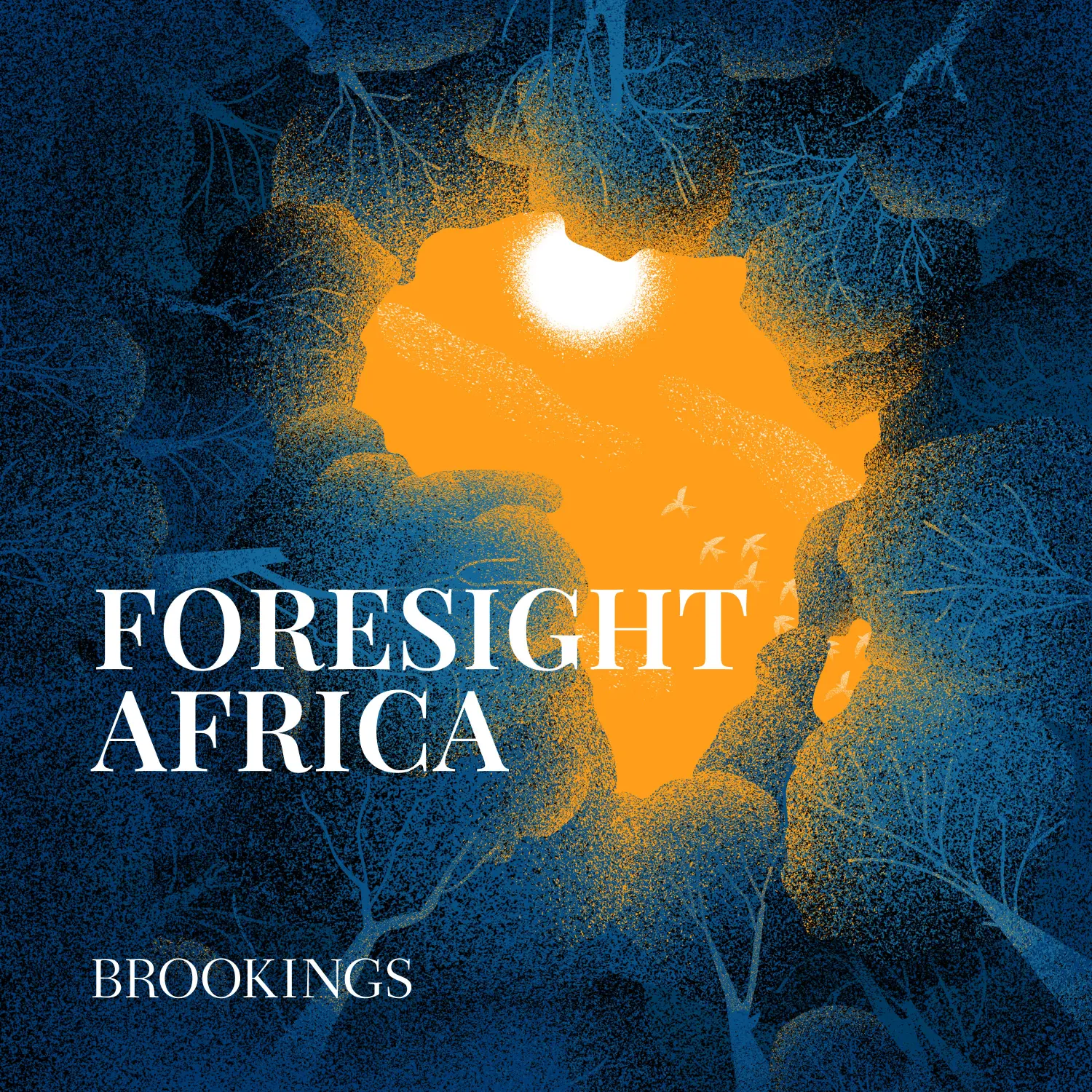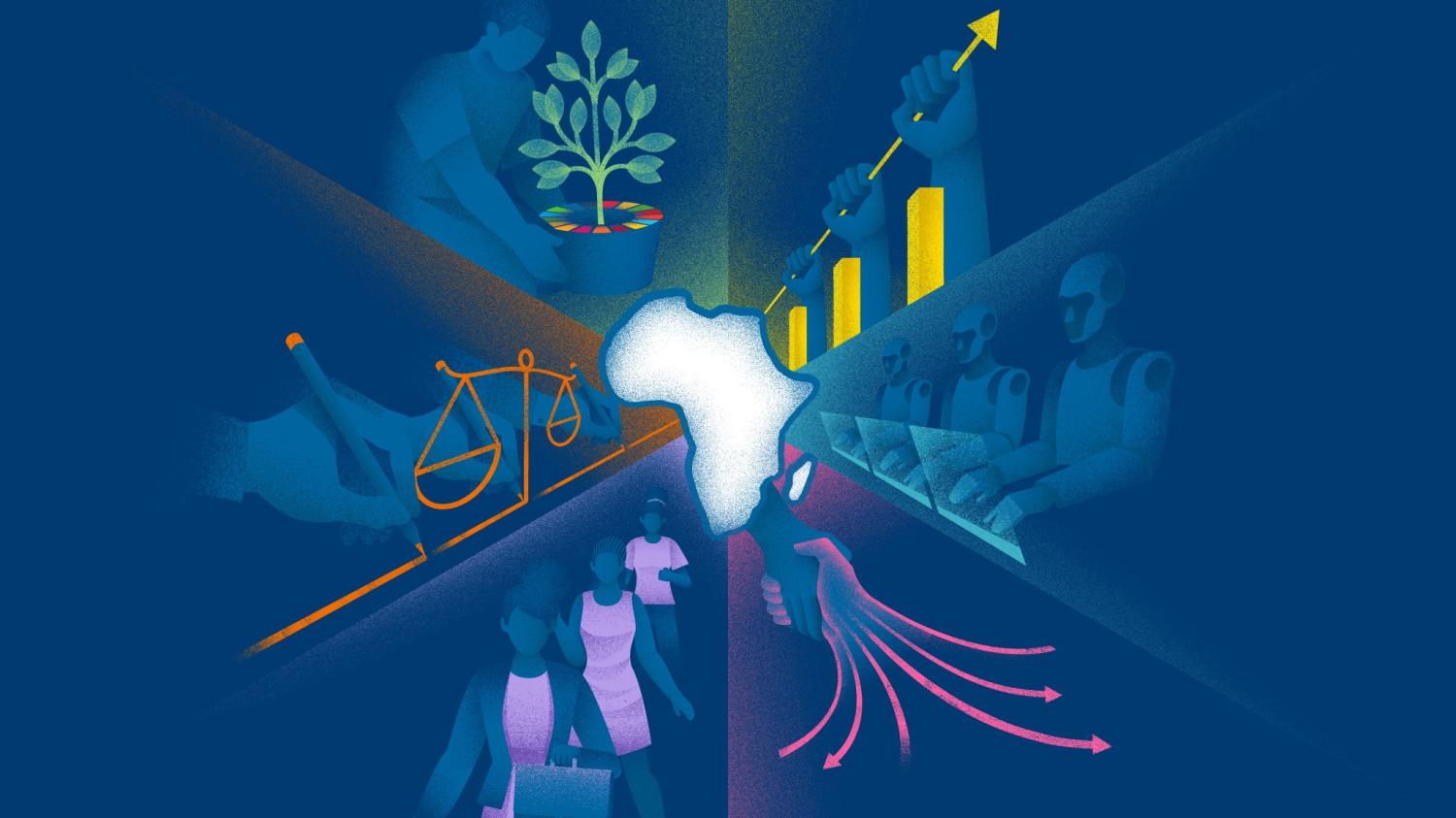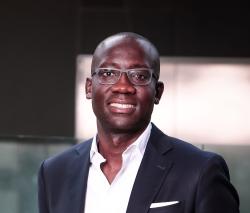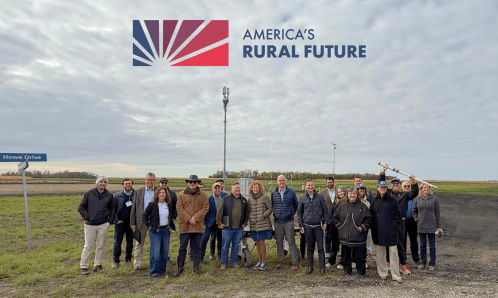Host Landry Signé speaks with Acha Leke, chairman of McKinsey & Company’s Africa Region and senior partner in their Johannesburg office, about Africa’s many advantages in human and natural resources. Leke explains how different actors, from family-owned businesses to national governments and international investors, can align themselves to benefit from the continent’s strengths.
- Subscribe to Foresight Africa on Apple, Spotify, Afripods, or wherever you listen to podcasts.
- Listen to previous episodes.
- Watch episodes on YouTube.
- Learn about other Brookings podcasts from the Brookings Podcast Network.
- Sign up for the podcasts newsletter for occasional updates on featured episodes and new shows.
- Send feedback to [email protected].
Transcript
[music]
SIGNÉ: Hello, I am Landry Signe, senior fellow in the Global Economy and Development program and the Africa Growth Initiative at the Brookings Institution. Welcome to the Foresight Africa podcast, where I engage with distinguished leaders in policy, business, academia, and civil society to share their unique insights and innovative solutions to Africa’s challenges while highlighting opportunities to advance engagement between Africa, the U.S., and the global community. You can learn more about this show and our work at Brookings dot edu slash Foresight Africa Podcast.
My guest today is Dr. Acha Leke. Dr. Leke is a senior partner in McKinsey Johannesburg office and chairman of McKinsey’s Africa region. He serves public, private, and social sectors across Africa and has worked across more than 20 African countries to date.
Thank you so much for being here today, Dr. Leke.
LEKE: Thanks, Landry. Thanks for having me. Very excited.
SIGNÉ: Your educational background is in electrical engineering at Stanford University, yet your current work has you navigating complex development and economic contexts across Africa and even the world. Can you tell us about your path from studying engineering to becoming the chairman of McKinsey’s Africa’s region?
[2:08]
LEKE: Well, it was a long path. As you said, I did a Ph.D. in electrical engineering at Stanford. But very early on in my Ph.D. journey, I realized I didn’t want to be sort of just an engineer anymore. And so I thought about what else could I do, and I got fascinated by some of the business classes I took. And I thought, even if I don’t be an engineer, why don’t I go and learn about business? Also at Stanford at the time, as you know, everybody was starting a startup. My advisor, my Ph.D. advisor, was on his third startup at the same time. He’d made quite a bit of money. I was like, wow, this is quite exciting.
So I thought, why don’t I go and learn about the business for a few years and then come back into a startup but more on the business side than on the engineering side?
And so I spent first a summer with McKinsey, all the summer with McKinsey in South Africa. I was the first summer associate we had on the continent. That was the only office we had. I really enjoyed the experience. Got an offer to come back full time to South Africa. I finished my Ph.D.
SIGNÉ: Amazing.
LEKE: Yeah, well you have African parents. My parents were like, we sent you to America, why are you trying to come back to Africa? Stay in America and get a job. So this was the late 1990s, right, nobody was moving back to the continent. And so I decided to start full-time out of the Atlanta office.
But while doing that, I was still very passionate about Africa, Africa just kept calling. So while I was based in the U.S. with McKinsey, I did some work in Uganda and some work in Nigeria. And I just realized I was just much more passionate about serving clients on the continent. And I decided to transfer to our Johannesburg office for one year. And that was 23 years ago. And I never went back, at least not for work.
So I spent four years in Nigeria setting up an office. I then moved back to South Africa about 10 years ago now. So I’m based there. I chair a practice across Africa. We have seven offices and about, you know, 400 or 500 consultants across these offices. And do exciting work across the region.
SIGNÉ: Amazing, Acha! At McKinsey, you have led initiatives as diverse as health care, family-owned businesses, and tax administration. With your vast knowledge of the challenges that Africa is facing on the path toward achieving the Sustainable Development Goals, what areas do you see as the biggest hurdles for the continent as a whole?
[4:47]
LEKE: Well, I always like to start with biggest opportunities, if that’s okay with you.
SIGNÉ: Absolutely, absolutely, I love this, too.
LEKE: If you look at our “Lions on the Move” report, we said, look, let’s talk about the opportunities in Africa while recognizing the challenges and the risks, as opposed to leading with the challenges like everybody was doing at the time. So, I’d love to start with opportunities. Again, opportunities across the board. I mean, this is the land, as we know, of opportunities.
So when I think about opportunities in Africa, I get excited by a number of things. One is, if you look at some of the KPIs, you can potentially start to see the beginning of another economic, hopefully, boom, right? I’ll just give you one example. Between 2000 and 2010, when everyone was talking about Africa rising, that’s sort of the Africa rising decade, you know, as a continent, we grew at 5.1%. But what was exciting is that there were 16 countries that over that 10-year period grew on average at least at 6% a year. And I think 6% is critical. It’s the minimum we need to really lift people out of poverty, but you need to do that on a consistent basis.
Between 2010 and 2020, that number went to nine. Only nine countries grew at 6%. Over the last four years, that’s gone back up to 15. And so we’re starting to see more and more countries doing the right things, putting the right reforms in place to drive strong economic growth in a continent where population is growing at 2.7%. So that’s one.
Two is, I think we’re seeing some clear success stories from a growth and economic transformation perspective. Right? You look at Ethiopia has grown at 9% a year—not for one year, not for five, not for 10, but for 20 years. Rwanda, and I’m in Kigali today, Rwanda has grown 7% a year for 20 years. That’s really what you need, right? Look at Cote d’Ivoire, they’ve grown at 6% plus a year for over 10 years, right? So that’s really you need to help transform our economies.
Third is our population, right, look at the talent in Africa and the workforce. We will have 800 million people joining the workforce over the next 25 years in a context where China is going to lose during that period 200 million people to the workforce. I always say the world is going have to turn somewhere for talent, right, and they’ll turn somewhat to India because India is going add 180 million or so, but they’ll turn to Africa. And I really think that talent could be our next oil if we do things right. This is why I get excited about the continent.
[7:22]
Now you asked about some of the challenges. Right? And there are again a number of challenges. I think of them in sort of three or four buckets. One is everything around domestic resource mobilization. How do we just mobilize resources to fund our own development? If you start with government revenues, governments are just not monetizing their economies. Right? If you look at government revenue to GDP across Africa, it’s roughly about 20% today. In Latin America, it is 25%. In Europe, it’s 35%. In North America, it’s 40%. So the question is, how do you get more money and more revenue out of the resources, out of your economy, because you need that to then fund some of your growth. So I think there’s one challenge around just, you know, the money, the resources we generate ourselves.
That gets compounded, so okay if we’re not generating enough resources, well let me attract investments from outside. And unfortunately FDI has been on a decline on the continent. And the reason is because, you know, I always say people don’t invest in countries, they invest in projects. But if your project doesn’t give them the kind of return that a project in Mongolia or in Brazil would give them, they’d go there. So we need to put in place the environment to make sure we can attract more FDI into the continent.
So if you’re not generating enough revenue yourself, you’re not able to attract investments, then are you getting donors to come in and fill some of the gap? And we were doing that for a while, so you look at the changes in the overseas development assistance, look at what’s happening, 40 percent of ODA as you know well went to Africa. And we know that that you know it’s pulling back, and the U.S. pulled back and we’re seeing Europe is starting to pull back as well.
And in some countries, yes, some countries will be able to step in and try to you know fill the gap and many countries won’t. Some African countries, we looked at just on the health budget, some countries have to more than double their health budget to fill the gap. So all on mobilizing our own resources, I think that’s one area that we need to work on.
The second area for me, and I do a lot of work in this, is the government execution and delivery. Many of our countries have these big plans. We have these visions. We’ve actually developed many of these plans for so quite a few of these countries. But where the rubber hits the road and where we fall short is in execution. Right? How do you really drive public sector execution and how do you bring private sector type mindsets, approaches, tools to the public sector to support execution? So I think the whole government delivery is an area that we need to spare attention to.
But at the end of the day, I always say when you go deep and you ask the five whys, I think the real root cause is a failure of leadership. And where we’ve seen good leaders emerge on the continent, we have actually seen great things happen. And so the question for me is, and we’re starting to see more and more such leaders, but we need a lot more. So what’s it gonna take to get a lot of these good leaders to emerge on the continent?
SIGNÉ: This is incredibly amazing, Acha. I really like how you started answering this question by focusing on the phenomenal potential of the continent and the opportunities across the continent before discussing some of the challenges but also connecting with strategies for success.
Acha, for this year’s Foresight Africa report, you and I co-authored an essay with your colleagues, Mayowa Kuyoro and Omid Kassiri, on Africa’s inner strengths and how they can be leveraged to overcome some of the challenges you discuss. What are these inner strengths?
[11:00]
LEKE: First, thanks again for the opportunity to co-author this article with you. I think we both feel very strongly about the opportunity in the continent and what’s it going to take to capture it. So it was a great experience working on this with you.
I started talking about some of the trends, right? But I mean, if you want to, you know, a few that we mentioned in the report, of course you have to start with natural resources. We have a wealth of natural resources in Africa, especially now as the world is moving more towards, you know, sort of transition. We have the critical minerals for this transition.
Now the question is how do we make sure we leverage them as much as we can and differently from what we’ve done in the past with our oil and gas and our mining assets. The focus there is really about how do we do more of the downstream production value addition in our countries versus just extracting these resources and sending them somewhere else to be processed. So the natural resources is a clear, clear, clear strength of ours.
Our youthful population, I just talked about it, right, the numbers speak for themselves, right? You know, the average African is 20, with huge potential and huge upside. If you’re a consumer-facing company, you cannot ignore Africa. That’s where your consumers are going to be. There’re more babies born in Nigeria every year than the whole of Western Europe combined. So if you’re a diapers company, a babies’ food company, where’s your growth gonna come from?
[12:24]
The third I’d mention is technology. And the opportunity then gives us to leapfrog, like we saw with mobile phones, where we can just completely leapfrogged and how that has taken off. We’ve seen that now with financial services, and many people didn’t have bank accounts. But now if you look at of all the mobile money accounts in the world, 60% are in Africa. Right? So we really, really leapfrogged to financial services. So technology is fundamentally transforming the continent and it’s helping us to close the gap with the rest of the world.
The fourth is urbanization. We are the fastest urbanizing region in the world—every year about 24 million people move to cities. The number of cities over 5 million people is growing very fast. There are challenges, let’s recognize it, right? The challenge we have is that in every country, basically have one big city and a bunch of small cities. There are only four countries that we found in Africa where the second biggest city is at least half the size of the biggest one. In most of the countries, the second biggest one is less than half the size of the main city.
So there’s questions around how do we improve the experience and infrastructure in our primary cities where everybody’s flocking into. But how do we also go and build more and better secondary cities? And how do we then attract investment and attract jobs into those cities. So those are some of the strengths that we can build on.
SIGNÉ: This is fantastic, Acha. And how do you see them being leveraged over the next 5 to 10 years?
[14:00]
LEKE: I think we’re going to continue to leverage these strengths over the next years in many ways, right? So for me the key metric here is how many countries are going to be able to grow consistently, like I said, above a 6% economic growth rate. Right? And I’m hoping we’re now seeing the trend change. And so hopefully, we’re going to see many more countries, and especially the bigger countries. Because the reality, I did say it’s 15 countries, but the truth is, these 15 countries account for about 20% of Africa’s GDP. Because the fast-growing countries today tend to be the smaller ones. We need our big economic engines. We need our Nigerias, our South Africas, our Egypts, right, to be to be humming again. So that’s critical.
Two is the talent opportunity. Like I said I’m a fundamental fundamental believer in this opportunity. So when it when it comes to talent, like I said, we will have this talent on the continent and people are gonna turn somewhere for this talent. I look at what India did. I just came back from, we had our global board meeting in India. So I just spent the last three days in Mumbai. And I was just blown away by what the Indian economy has been able to accomplish. Right? This is a country where manufacturing is 15% of GDP and the country has grown at 7% a year for the last 10 years. They want manufacturing to get to 25% of GDP.
We know the outsourcing story coming out of India. And I really believe that we can build a similar story in Africa. We have the talent. We also have the cost-effective talent, because the talent here is actually cheaper today than the talent in India. And we have the technology to make it happen.
And so I think if we get it right, for me one of the big opportunities going forward is creating Africa as an outsourcing hub for the world. For some of these jobs our Africans are going to leave and go to other places to provide these jobs which I think is also fine. But for many of the jobs, our people are going to stay here, and they’ll be providing those services from the continent. So that’s another big opportunity I see.
SIGNÉ: Fantastic! Your recent report on family-owned businesses showed a significant gap between high and low performers in South Africa. What qualities made those at the top more successful?
[16:21]
LEKE: So we’ve done a lot of work trying to understand family businesses and how they create value. And I have the pleasure of actually leading that practice globally from McKinsey now. And we serve many family businesses around the world, as you can imagine. And we said we want to be the value creation and impact partner of these families. And we said if we want to do that, we need to really first understand how these families create value.
So we did a massive piece of research. We analyzed 600 publicly listed family businesses. And then we compared their performance to another set of 600 publicly listed non-family businesses. We then surveyed another 600 primarily private family businesses, and we did about 20 interviews. So it’s about a 2,000-company data set, very rich data set.
And family businesses, as we know, it has been well-written that they actually outperform non-family businesses on any metric you want to use: return to shareholders, stock market, appreciation, all of that. But the question is why? And that’s what we were looking at. And then we did a report. We had a report on India and one on South Africa to tailor it.
But if you look at, out of those 2,000, we identified 125 companies, you call them outperformers. Right? These are the absolute best family businesses. And the interesting thing is family businesses outperform non-family businesses, but the absolute best family businesses, they outperform the absolute best non-family businesses by even more. So they’re really, really good at what they do. And we said, let’s go and study them and try to understand how they do it.
And I won’t go through all the details, but we came up with four mindsets that they have as they run their businesses and five actions. I won’t go into all of them. But just a few on the mindset: purpose ahead of profit. Right? So, of course they want to make money in their business, but they lead with purpose. I just met, again, when I was in India one of the family businesses there and that’s really what they talk about. They talk about purpose and how they’ve embedded purpose through the entire organization.
Taking a long-term perspective is something that’s important. They reinvest money into the business. So the dividend yields are lower. They don’t take money out. They actually reinvest into the business.
They’re cautious financially. So they’re careful about how much debt they take on. Sometimes that comes at a price, by the way. Sometimes they’re a bit too cautious. But they’re conscious financially. So those are the kind of mindsets they have.
[18:42]
On the actions, you know, I’ll talk about two or three. One is they’re incredibly diversified. Forty percent of the outperforming family businesses have more than 50% of their revenue from non-core activities, and that’s relative to 7% for the others. So a huge difference, 7 versus 40. Very, very diversified.
So the second part of this recipe, when it comes to the critical actions, number two is capital allocation. And this question is how much do you reallocate the capital in your business towards areas that you think are gonna provide you a higher return. But that also means that you’ll be starving some businesses of capital. Right? And it’s hard for businesses to do this. If you look at the outperformers, when we asked them, what percentage of you have been able to reallocate at least a third of your capital over a five-year period to new businesses, 60% of the outperformers said they did it versus 20% of the non-outperformers. That’s a three-x differential. And so this whole idea about identifying opportunities, really say I’m gonna put money and resources behind that opportunity at the expense of some existing things I’m doing is actually critical and the out-performers do that very well.
So the third point on the critical actions is talent. And the outperformers actually obsess about attracting, developing, and retaining the absolute best talent. And what you find is talent in these companies tend to stay much longer. They’re very loyal. They see themselves as part of the family and they’re incredibly loyal. Right? So they really think about how do you make sure you have the best talent and how you retain them over time?
And the final point which I think is actually critical, especially for many of our African FOBs [family-owned businesses], is governance. How do you put in place a proper governance structure? The right board? How do you make sure family members are also involved in making some of these key decisions? Non-family members, not just family members. How do bring some professionals sometimes onto the board? Or sometimes into the business as well? We’re putting in place the right governance, because that’s what allows you to sustain over time. Just to give you a number: only 5% of family businesses globally survive the third generation. And I would argue that that number is even lower in Africa, but the big issue is because of this governance point.
SIGNÉ: Fantastic! Acha, how can family-owned businesses across the continent emulate their successes?
[21:19]
LEKE: What we found is this formula—we call it four plus five, right? the four critical mindsets and the five strategic actions—this formula works. It’s shown that it worked. We’ve actually done the analysis. And what we then showed is, if you actually do this and companies that did this, they were able to increase value by 4x over a 5 to 10 year period, four times. And so that’s exactly what I’d say companies in Africa should do, is take this formula, apply it, right, and it will really help you increase value significantly.
SIGNÉ: I love this, Acha. One of the many ways you are using your platform to help those around you is through the co-founding of the African Leadership Academy and the African Leadership Network. Why are initiatives like these so important in creating sustainable growth on the continent?
[22:19]
LEKE: Well, you know, I fundamentally believe that part of our responsibility is to find a way to contribute to Africa’s economic transformation. We all have a role to play. Right? It’s easy to blame others and blame different people. But I think we need to own that and figure out, if we as Africans don’t do it, who’s going to do it for us?
And so for me, there’s always a thought of saying what can I do differently? Or what can I do to contribute and to make a difference? Beyond what you are doing at work, especially those of us who are fortunate enough, you know, to be able to have a good education, have a good job. What else are we doing to make a difference on the continent?
And so, as we thought about that, and we really like to believe, you know, we should do hard things, but we also should do big things, things that are big. Because, you know, yes, we will support families and our cousins left, right, and center. That’s good. But those of us who were fortunate enough to be in this position should do more.
And as a result, you know, with Fred Swaniker and a few others we decided, given one of the biggest issues of the continent is leadership, how can we help train the next generation of African leaders? And on the back of that, we then started African Leadership Academy. We just had our 16th graduation. And, you know, it’s been going from strength to strength. And, you know, we’ve had 1,700 students graduate. And many of them have actually finished university and are working on making a difference across the continent, which is hugely exciting.
But we said that wasn’t enough. Right? So we then started Africa Leadership Network, which was to bring people like us at this current generation of Africans together to see how we can work better together to make a difference on the continent. We realized 80% of our students were going to the U.S. for university and we said, why can’t we build Ivy Leagues in Africa? And so we started Africa Leadership University. We have a campus in Mauritius, we have campus in Rwanda, we’re about 2,000, 2,500 students.
And it’s all about us trying to play a role to help transform leadership in Africa. And my encouragement to everybody is to say, what do you want to play a role in helping transform? And versus complaining about it not happening, go try to make it happen yourself with a set of folks.
SIGNÉ: Fabulous Acha! Your dedication to give back to the community is incredibly wonderful. I always like to end each interview by asking the guest two questions. First, building on your work and experience, what is one piece of advice you would give to African or global policy makers to ensure the best outcomes on the continent?
[24:55]
LEKE: Interesting. But I think the advice for African policymakers may be different from the global. Right? Across the board, I think there’s a “believe in Africa.” Come with a mindset of believe in African and believe in Africans. We have what it takes to help transform our continent. We need some help; we of course need some help. But we have it takes, so believe in us.
The second thing is hold us accountable. For me, the global policymakers, how do we leverage their power to actually hold us accountable, hold our leaders accountable for delivery, because we all need that. Right? And so I think there’s a believe in us that we can do it, but then hold us responsible to make sure it happens.
SIGNÉ: Fantastic! Lastly, given your successful career and impact, what advice will you give to youth hoping to follow in your footsteps?
[25:52]
LEKE: I tell them three things. I tell them work hard. It’s easy to look at people and say, oh, they’ve arrived. But you have no idea what they went through to get there. And it all starts with hard work. So I encourage them to work hard.
I also encourage them play hard. Life is short, right, so make sure that along the way you’re having some fun. Some measured fun, right? but make sure you don’t just work, right? Balance the two.
And the third thing I ask them to do is sort of where I started earlier is to contribute to Africa’s economic development in whatever way, shape, or form. Right? But really feel an obligation and a responsibility to contribute because we all owe it to our continent.
[music]
SIGNÉ: This is insightful. Acha, thank you so much for joining me today.
LEKE: And thanks for having me. Really enjoyed the experience.
SIGNÉ: I am Landry Signé, and this has been Foresight Africa. Thank you, listeners, for joining me today.
The Foresight Africa podcast is brought to you by the Brookings Podcast Network. Send your feedback and questions to podcasts at Brookings dot edu. My special thanks to the production team including Fred Dews, producer; Nichole Grossman, Dafe Oputu, and Nicole Ntungire, associate producers; Gastón Reboredo, audio engineer; and Izzy Taylor, senior communications coordinator in Brookings Global.
The show’s art was designed by Shavanthi Mendis. Additional promotional support for this podcast comes from my colleagues in Brookings Global and the Office of Communications at Brookings.
The Brookings Institution is committed to quality, independence, and impact.
We are supported by a diverse array of funders. In line with our values and policies, each Brookings publication represents the sole views of its author(s).









Commentary
PodcastPopulation dividend, technological leapfrogging, and high growth rates signal opportunities for African economies
Listen on
Foresight Africa Podcast
July 9, 2025